|

Peering into a felled hollow log.
(*photo credit)
September 1, 2018 Seventy-Nine Years Ago: Second World War Begins
The ranks of those of us who remember the start of the Second World War are thinning now. In fact, I remember that infamous September first, not because it was the day Germany invaded Poland, but because on that Friday my mother took me to a half day of school; this was my first day of school -- and the teacher was Sister Imogene, who lived to be 103 and died a few years ago.
Over that weekend in 1939, Great Britain and France declared war on Germany, and the conflict quickly expanded to include a major portion of Europe. As the war progressed and was discussed by my family and relatives, I listened to their conversations and to radio news reports as well. By the third grade, I was reading the daily newspaper in order to glean war information.
That Second World War was bloody: an estimated 50 million fatalities. People died in concentration camps, on the Russian front, in air raids, and in fighting on land and sea. By the time the Americans entered this conflict in December, 1941, the fighting was waging across Europe, Asia, and Africa and even approaching Australia. In retrospect, we appreciate the anguish experienced by so many, both those in the military and loved ones far from harm's way. Here at home, the rationing of gasoline, tires, sugar, and other items made us acutely aware that others were undergoing a supreme sacrifice an ocean or two away.
With the fading hopes of the First World War to end all wars and the subsequent Great Depression, the people were somewhat realistic. We have to make and earn peace. Evils arise and must be confronted and this takes effort; we simply have to learn to become cooperative and not exact reparations from down-and-out defeated people. On the local level, folks helped each other out during the labor shortages; the school kitchens became summer canning centers; the gold stars on front windows meant a loved one had died fighting. At the international level, the heads of states were having meetings. They were talking of a "United Nations" to replace the toothless League of Nations. Even through those dark days, a slender silver lining of global cooperative efforts towards world peace was beginning to appear.
September first was not a day to celebrate as was the end of the conflict on May 8, 1945, in Europe and August 15, 1945, in Asia. This September while we fight Middle East Wars (the longest span of war in our history) we are reminded that armed conflicts come with the terrible suffering of displaced, abandoned, maimed and terrified people in many places. Only after that Second World War did my family find out that our cousins in Alsace were forced on September 1, 1939, to undergo part of the largest evacuation ever undertaken by the nation of France and their town devastated in the last months of fighting. May warfare soon cease.
Prayer: Lord, make us a peaceful people who detest war and can control those seeking to bring us to another disaster.
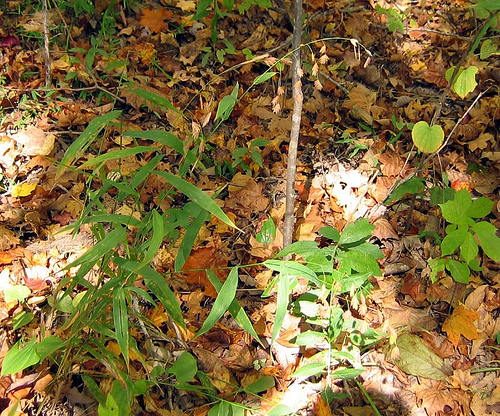
Oat grass, with seeds. Land Between the Lakes, KY.
(*photo credit)
September 2, 2018 Acting Justly in Troubled Times
The one whose way of life is blameless, who always does what is right. (Psalm 15:2)
The Gospel (Mark 7) gives an example of those who were concerned about right action, but their concern involved petty things that were of little importance. We sometimes wonder if the world around us is more concerned about small things, while the big ones are being totally overlooked. In fact, we wonder whether we are so concerned with cultural correctness (sprinkling vessels or maybe pesticide-laced produce), that we are ruining the world for a future generation. In a nation that has had wasteful resource consumption practices we ought to ask some meaningful questions. These will make us more honest about the ways we act:
* Do we acknowledge our misdeeds?
* Do we spend too much on items we do not need?
* Are the foods we like best always healthy and nutritious?
* Are the cleaning agents we purchase really cleaning?
* Do we really save fuel or only drive about needlessly with an
economy-style vehicle?
* How do we spend our free time -- as if some time is free?
Having asked these rather negative questions let us ask some positive ones, for this exercise is not meant to stop with our admission of shortcomings alone. In today's gospel passage (Mark 7) the apostles are accused of overlooking the regulations that mean so much to the scribes and Pharisees. Better questions are:
* Are we committed to doing what is right in hard times?
* What innovative ways do we use to bring about good environmental practice?
* How do we give encouragement to others who are deeply depressed due to financial difficulties and lack of employment?
* Do we invite the unchurched and despairing to come and share in worship?
* How much do we thank God for the good things given to us?
* Are our hearts with the Lord and with those who suffer?
The first series of questions refers to purifying our own hearts for the troubled times we all experience. If we are greedy and selfish, then we continue business as usual when others suffer. When we see challenges, we see these as opportunities to become more compassionate towards those who suffer. We look beyond ourselves and extend a hand to those who are less fortunate. Saint James' Letter (Chapter one) mentions orphans and widows -- and we add to this arena of concern all the world's needy. We seek a merciful heart, willing to forgive quickly, and solicitous to easing the burdens of those who find these times to be rough.
Prayer: Lord, give us the ability to ask the right questions at the right time and place, and to be open to the real needs of those around us. Help us convince the climate deniers to change.

End of summer memories on Labor Day.
(*photo credit)
September 3, 2018 Labor Day and the Privilege of Work
Labor Day ends the traditional American vacation period. It is celebration for many, but a time of anxiety for those seeking a better or more full-time position -- or just the chance to work at a reasonable wage. The labor situation continues in a flux. Harassed workers who object to more difficult tasks may receive a pink slip. Today unemployment is relatively low as a base statistic, but this never tells the whole story.
I have always enjoyed working. From earliest times on the farm, we learned the dignity of work, from those who enjoyed working and were proud of the products of their labor. However, for many, forced labor or bad labor conditions tarnish that ideal approach to labor. It is best to speak of labor freely undertaken or contracted, and labor regarded as worthy of achieving results for the benefit of the individual, family, and/or community. Perhaps half the world's workers are tolerant of or even like the work they are doing. They find joy in a job well done, and are thankful that they have jobs to support their families.
Today, during a period of climate change and increasing job insecurity, millions of jobs have been lost to automation. Of course there is always a flip side; coal miners are laid off and solar energy workers are snapped up for an expanding market; however, the miner may not be the one who gets the new job without a strong retraining program. Yes, many people are desperate for meaningful work; they would gladly call a variety of opportunities “dignified" in order to provide a livelihood. Quite often, shortage of benefits brings many retirees back to the active labor force.
It is truly undignified to have no work when one needs it. Our country calls for citizens to show responsibility and to serve their country in need; in turn, it is the nation's responsibility to furnish a livelihood for each citizen, and thus it is necessary to provide work for the jobless who are willing and able to work. A stimulus package to improve the neglected infrastructure creates some new jobs, but this is not enough. Not everyone can do construction work. Caregiving for the sick and elderly calls for many new job openings. The under- or unemployed are not bargaining chips for a greedy capitalistic system; these are people worthy of the dignity of earning a reasonable living. Workers are willing; jobs are waiting; the capital is in the wrong hands and should be taxed, collected and expended on meaningful work.
The mistaken approach of gaining more profits by combining jobs, and forcing fewer people to do more and more, is to be condemned -- and the perpetrators ought to be made to do work themselves. By the same token, the unemployed pool is heartless. Dignity means to give each a fair portion of the work load, and equal dignity is to furnish meaningful jobs for all citizens.
Prayer: Lord, help us see that the dignity of work is related the gift of life; may we respect the privilege to labor for You.

Unidentified mushrooms through filtered light on the forest floor.
(*photo credit)
September 4, 2018 Prisons, Justice and Balancing Budgets
In proportion to population, the U.S. has the highest incarcerated rates of any developed nation, and very high among all nations. In the past four decades the number of federal prison inmates went from 20,000 to 135,000; inmates in state prisons from 268,000 to 1.3 million; and inmates in local jails increased another 700,000. If we include juvenile correction facilities and Indian country jails total incarceration exceeds 2.3 million or almost one percent of the American population. Another 4.75 million are on parole or probation -- though California and others states are reducing prison population as a financial savings.
At an average cost of $30,000 (some places higher) per prisoner per year, doesn't it make financial sense to put these unfortunate souls on service release as quickly as possible? Can't they live at home while monitored at a far lower price than in a correctional institution? Let them do the cleanup and repair work so desperately needed to put our country's outworn and neglected infrastructure back into shape.
Adding to this, when speaking of prisons and justice, is that we are one of the few civilized nations that still retain the "death penalty." Sister Helen Prejean, an anti-death penalty crusader, accompanied Patrick Sonnier to his execution. That episode inspired her book, Dead Man Walking, which has done much to make us reexamine our American criminal justice system. Prisons confine people in life-denying institutions which can dehumanize the individual.
Primitive people have less costly ways to exact retribution for misdeeds committed, including working within society. True, some life-giving efforts are being made even within the American prison system. Catherine Sneed, a volunteer, tells of improving her own prison work by developing a horticulture program at the San Francisco County Jail. In taking care of plants, prisoners began to understand the true nature of this life: growth, renewal and perseverance. The same experience occurs when prisoners are part of a seeing-eye-dog training program; their efforts are meaningful.
All of us who do volunteer or contracted services at prisons know that such institutions ought to be smaller; many of the incarcerated could be gainfully employed in communities rather than cloistered behind prison walls. However, this crusade is not possible within the institutions; it must be done by those citizens on the outside who can help influence legislators to initiate prison changes. "Three strikes and they are out" is about as insane a rule as ever devised; it is costly to prisoners and doubly burdensome to the taxpayer. Let's be fiscally conservative, for literally billions of dollars could be saved through a non-prison public service program. Contact and lobby your legislators!
Prayer: Lord, give us the grace to effect change so as to give prisoners the opportunity to do beneficial community service.
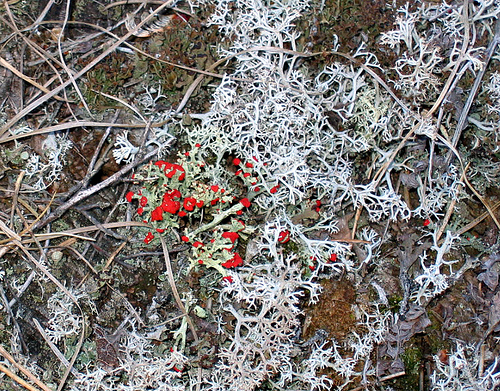
Cladonia cristatella, British soldier lichen.
(*photo credit)
September 5, 2018 Support Single-Payer Health Insurance
This daily reflection site is not intended to endorse specific legislation. However, a general issue is emerging, which is a major moral issue, demanding that people speak out, namely in favor of single-payer health insurance, the legislation of which needs to be specified Today, the expensive American health issue is occupying the minds of many of our citizens. We have witnessed a massive infringement on our rights as a democratic people; namely, lobby groups of health insurance and pharmaceutical companies have financed a supposed "opposition" to confront elected legislators at town hall meetings throughout the country. In recent years hecklers have not allowed legislators to make a just health policy.
Why has this happened? It is not because a single-payer plan (similar to Medicare) is a bad policy. It addresses the major demand for citizens who opt for a universal health care to satisfy the right to all for health available. Surprisingly, many want every American covered by health care; the great majority support government-run health insurance. The administrative costs of doing this through a single-payer program are cut dramatically and make the program doable, as with Medicare (a single-payer plan), which is run efficiently through the federal government. The advocates of private plans show total inconsistency, because, under Medicare, people can still choose their doctors and their treatments. The opposition does not have a better plan. Their proposals (if they have any) would just be more profitable to the health insurance industry. Why should companies make massive profits off of health?
The public must have a right to know and hear the opinions fairly and dispassionately -- and this has not been the case in the past decade before, during and beyond Obamacare. In preparation for what we have received is the historic fact that single payer advocates were so side-lined that thirteen were arrested for wanting someone of their number to speak in congressional hearings. In 2009 Public Citizen's Dr. James Floyd said, "By excluding single-payer supporters from hearings throughout the year, Congress showed that protecting the profits of the insurance industry was more important than providing quality health care for all Americans." Public Citizen, July/August, 2009, p.6
The issue will simply not die and in 2017 Senator Sanders and an increasing number of senators raised the issue again. But the opposition by profiteers to any major progressive legislation is formidable. However, younger voters are less inclined to be frightened by the label "socialistic." A single-payer plan saves precious public funds; it reduces the combination of private and public bureaucracy expenditures by hundreds of billions of dollars each year. This "public plan" that resembles what most progressive nations have adopted in one or other form is needed and ready for our country to accept. Help hasten it!
Prayer: Lord, help us to promote the right of all citizens to access to proper health care.

Unusual parasitic plant, pinesap, Monotropa hypopitys.
(*photo credit)
September 6, 2018 Consider Your Appliance Use
Appliances surround us, distract us, assist us, and still cost us economically and even emotionally. We take them for granted, even though most are twentieth century inventions. For many of us, our grandparents were scrubbing clothes on a wash board, or mopping or churning butter by hand; in an uncomplaining and loving manner, they were doing the chores that made life pleasant for their family. Consider making fires for cooking breakfast and warming the coffee, lighting a kerosene lamp, getting all news from a neighbor or newspaper with no electronic media, fetching water from the cistern, or bringing cooled milk and eggs from the springhouse, where it is partly refrigerated through natural cooling. Without noticing it, we accept electric appliances as an integral part of our lives -- and we are acutely aware when a power grid fails.
* Know what appliances you have got. Take time to jot down all the appliances that are in the home. Which ones are used and for how long? Which are broken or just left around unused?
* Replace inefficient appliances. Homemakers make appliance purchases and replacements. In so purchasing, consider a prime concern to be energy efficiency. Federal regulations require that the appliance's energy requirements are to be posted and easily available. If this energy efficiency information is puzzling, the salesperson will assist in understanding what is meant. On second thought, do we even need this or that appliance? We could use a safety razor, or sharpen the pencil with an old-fashioned sharpener, or mix food ingredients by hand, and get some exercise.
* Be aware of energy use of existing appliances. Some appliances, especially resistance heating devices, are heavy energy users. Consider airing out the house rather air conditioning it during summer. With a little research, one can find out how much the various devices use. We need not keep certain appliances such as stereos and televisions plugged in or on when not in use, for these consume some electricity, even when placed on standby.
* Use appliances conservatively. Some of us do not have dish washers or use air conditioning, but many others do. When one does use a dishwasher, conservationists recommend adjusting to an energy-saving setting, which eliminates the drying of the dishes by heat. Hot water heaters (consider solar or tankless and instant demand types) could be turned down to the highest temperature required for domestic use (120 degrees Fahrenheit). When washing clothes use only cold or warm water.
* Choose wisely. So often we use the wrong appliance: the microwave could do the same heating as the stove with less energy. Cooking large batches is better than cooking frequent smaller ones. Wash larger loads of clothes. Consider clothes-line drying.
Prayer: Lord, make me conscious of energy demands for the ordinary tasks of living, and direct us to live more simply.
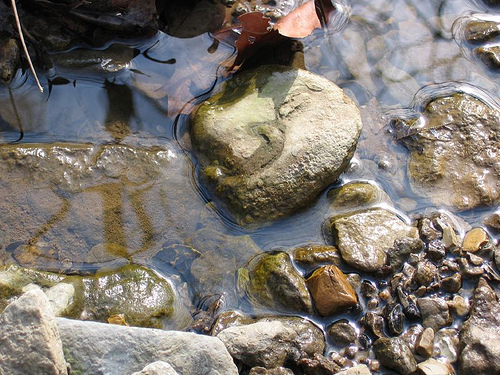
Stones along creekbank, art from natue.
(*photo credit)
September 7, 2018 Encourage Artists and Artisans
Today is Grandma Moses' birthday (born 1860), and her life gives us the courage to say we all can be artists or artisans -- to some degree. At least, if beauty is in the eye of the beholder, and if we see the work of our hands as producing a beautiful product, we can call our work "art." This may be regardless of what art critics say. We all have noble aspirations, and an innate desire to be creative. It may be in painting, sculpture, architecture, designing, cooking, metal-working, weaving, knitting, gardening, or a hundred other things. My dad liked to make wooden carvings, something he started as a youth and suspended during middle life farm and construction years. Many agreed that he was a primitive artist. My mother's flower garden was also a work of art, and both our parents inspired artistic expression.
Appalachian people are quite creative and are drawn to crafts and arts in free time, and especially after so-called retirement. They believe that a major ingredient of successful art is the selection of materials, along with ways to arrange them so as to bring out particular expressions not commonly observed. The individuality of this Appalachian primitive art is what is so striking and enduring. In some ways, a rigid structuring of the art forms that these people practice would most likely destroy their creative urges, and reduce them to mechanical workers. That is why the quilter should decide the pattern of a quilt, not allow outside marketing experts to impose their designs on quilters.
It is humorous when an unknown work of "art" has been decorating a place, and suddenly experts decide it is painted by a famous person -- and the price goes from nearly nothing to millions. Really? Is the hidden art honored or desecrated? The opposite occurs when a supposed priceless art piece is found to have been created by an unknown -- and it loses its value. Doesn't such rise and fall in prices indicate more capitalistic commerce than art choice? Looking about, we find in our region art appreciated by both the artist or artisan AND others. Creators have the courage to go public, and patrons have the courage to patronize the honest and true "artistic commons."
The public display of one's expression is like a word spoken for the first time; it expresses what is inside, and it invites observation and judgment. Acceptance is another matter. A comment like, "Well, if that is the best one can do, don't waste the paint," is cruel; this is most likely an expression of a repressed artist afraid of going public with his or her work. One's art may not be ready for an art show. Even if unrecognized, it still decorates one's room, house, yard, outbuilding, or roadside display or graffiti. It is meant to add beauty. Appalachian people often decorate with personal ornaments. They break the bonds of non-professionalism and expose the artist within. Let it be expressed.
Prayer: Extend your creative hand to us all, Oh Lord, and let us recognize it and be creative as a sign of our gratitude.
Cultivating the Art of Aging
In this my birth month, when passing the midpoint of the 9th decade of my life, it is a good time to reflect on aging. We all age, but doing so while being of service to others is a challenge. We will grow in the aging process, if we welcome our current condition, and certainly not pretend to have the power to control it. Some few talk about the past years with a sense of relief, glad they do not have to be relived; others regret the many imperfections that have occurred and wish the span could be repeated with the wisdom now possessed; still others accept where we are and hope to make what remains of life better through our acquired experience and wisdom. Whatever our stance, living the present with a sense of gratitude is ideal.
Until recently it was a pleasure when someone would underguess my age. However, one Clay County fast-food server would guess ages perfectly -- the only one I ever met who did. Many more today know that my preferred photo of two decades ago is not the full story -- but must we always be up-to-date? Aging comes with the seasons and can't be retarded, and it becomes the grounds for the growth of wisdom. Regrets may be part of aging when recalling promising plans of early years, which were not realized. If we could only relive, but that's impossible. Live now more intensely!
I sometimes dream of jogging, my major regret of what I did in the past and cannot easily repeat. These dreams call for me to toss away my walking stick and just run and run and run. The comfortable feeling of a five-mile run with a dog for companion comes back vividly; that also occurs as a momentary daydream when driving past youthful joggers who shouldn't be breathing my and others auto fumes. Years of study or work experience or travels do not bring such feelings of past good feelings; only exerting, breathing, sweating -- and counting my jogger's steps. Forty-three years was my jogging span, even before "jogging" became popular; I'm thankful for the well-being that the practice afforded.
When some powers fade such as hearing, sight, smell, taste and balance in walking, we need not dwell too long on previous conditions, but be thankful for what is left, especially if our mind is in fair condition. Jesuits do not retire but end the years "praying for the Church and the Society." Some of us in our eighties remain by the grace of God in active service while fully aware that laborers are scarce. Yes, we must be indifferent about our good or bad health; however, I must confess I thank God everyday for good health. Those of us with activist tendencies do not like the thought of being shoved to a pasture of contemplation -- even while affirming that praying for others full time is a fruitful mission. It is certainly fulfilling being able to render service to others: an audience, our charges, my companions or new clients. These services are empowering in themselves and color an ever fading mortal span, promising enthusiasm and vitality to what mortal time remains.
Do we who age want to feel needed? Retirement is an ambivalent modern practice, unless seen as an opportunity to transition to areas of greater service. Most primitive and many civilized cultures regard a special role for elders who are experienced and retainers of wisdom; they are not retired but key to ordinary life and activity. Not so in our fast-moving youthful culture. As one aging colleague wrote me, "we can do things but they take a lot longer than before." Truly, my gardening takes more effort and assistance -- but this year has been (thanks to plentiful rain) the best one ever. For decades I preferred to garden in a solitary fashion but now I'm finding I need help in making raised beds, tilling, and staking beans. Gardening becomes a joint project -- and that extends to household chores like cleaning rooms and buying supplies. The art of aging includes a willingness to accept help even when we would prefer to do it ourselves. Let's say thanks!
Impaired mobility is the biggest cross for many of us. We can't jump in a car and drive hundreds of miles. Mobility restricts the aging elder's zone of activity. Just to sit and let others come to you is maybe asking too much in travelers' hurried schedules. For the less mobile, anxiety can arise; what if those who are home-bound are ignored and are considered living beyond their worthwhile years? Are crosses, pains and isolation worth it? Is quality of life in aging defined by community participation? Do we still have something to offer others?
Preparing well to transition to eternity is part of the art of aging. We could immerse ourselves in daily routines and fail to reflect on the Mystery beyond the horizon, always tempted to postpone the inevitable. However, reflection is needed. We hear the refrain at Christian funerals, "for the faithful, life is not ended but changed." Honestly, do we welcome even thinking about this transforming change? Do we find our relationship with Jesus of paramount importance? Do we listen for God to speak?
For those of us in relatively good health the task is to respect all of life's variables from food to stress, from exercise to rest. Conditions can change suddenly with a physical fall or through catching a cold. For better or worse, God gives us the chance to handle changing situations with faith and devotion. The art of aging becomes more a challenge when diminishment stares us in the face and calls for patience and equanimity. It is always a great blessing to see that some people do this so well. They teach us to accept all circumstances, and they become exemplars of what Pope Frances in Gaudete et Exsultate calls "the holy ones among us who live the Beatitudes."
We discover those who accept their station in life as models of the art of aging. They beckon us to welcome any transition coming in the near future. And "near" viewed from an accelerating lifetime is so close at hand; anniversaries always come quickly. The aged have the wisdom to see the shortness of life as stated in Psalm 90. Let's take life seriously, and with a smile.

Ripening fruit of persimmon, Diospyros virginiana.
(*photo credit)
September 8, 2018 That All May Be Literate
Today is International Literacy Day, a moment when we hear the deep aspiration of almost half the world's people, who are unable to read well. Some will be incapable or are not old enough yet; others called literate have a rather elementary reading ability. Many of the illiterate would deeply appreciate the opportunity to do what other citizens do: read a newspaper; understand the instructions on how to vote or register; read road and street signs; know the contents of a contract to be signed; read about the history of their local community; and on and on.
In this troubled planet, which needs a healing process involving all citizens, the ability to read is ever so liberating. This ability extends to all written languages, though knowing how to read a major language allows access to more written information and a host of materials. However translations are available for many. For instance, this writing is being translated into six different languages, and even though automatic translations leave much to be desired, still we writers cooperate by holding to plain text, and do not insert clever phrases or unusual expressions that are difficult to translate accurately.
What must we do about literacy? Some may be moved to team up with an illiterate person, and be willing to spend hours teaching him or her how to read. Such is a blessed person! Personally, I do not at this moment have the time or patience for such a one-on-one teaching situation. Ultimately, overcoming illiteracy in our world will take a massive mobilization of citizen teachers. If such one-to-one teaching programs employing retirees were instituted, total literacy would grow by leaps and bounds. A modest individual teacher's salary seems a massive expenditure, until regarding the enhanced life quality of the newly literate citizen. A small surcharge on all luxury items in the affluent world could easily pay for a worldwide campaign to eliminate illiteracy by 2030.
Illiterate people know they are handicapped and often try to hide the fact. Many depend on their friends or children in order to read necessary documents and acquire information to communicate properly; some must pay fees to have letters written or read; still others pretend to read medical instructions or vital information with severe consequences from not doing so properly. Granted a number of people deliberately cease reading, either because it is a difficult chore, or because they find it more convenient to get information by radio or television. However, even for these, only a limited amount of practical information can be told or shown through illustration. We need to be functional readers for practical purposes and for the sheer enjoyment of reading books, newspapers, periodicals and even movie subtitles. Libraries beckon and invite. An illiterate's eyes open in appreciation. Let's help.
Prayer: Lord, inspire us to assist others to take up the Good Book and read -- and then meditate on what is read.

Common buttonbush, Cephalanthus occidentalis, by creek's edge..
(*photo credit)
September 9, 2018 We Are Called to Be Healers
Did not God choose those who were poor in the eyes of the world to be rich in the faith.... (James 2:5)
St. James tells us that we are not to show favoritism, and omit those who may need our care and service. We know people who dote over someone who needs a little help; at the same time the same caregiver simply overlooks others. Becoming caring people, a needed ingredient to earthhealing in all its forms, requires some sensitivity to the degrees of need, not a fixation on an individual case. However, we know that some caregivers have limited time and energy, and thus must focus on the needs of loved ones at this time. An ability to both focus at a given moment, and cultivate a more general "catholic" outlook, takes a special grace. James is one who understands this challenge. We cannot overlook or dismiss the sick person who is neglected or out of sight. It takes a special grace to develop a greater degree of proper selection.
Insensitivity and favoritism make the healing process quite challenging in an age of affluence and selected care. A rich person with a major ailment is in need of care; so is a poor person with the same ailment. Is it right to divert all attention to the rich person, and ensure that he or she is not overly taxed or economically affected by a more universal health care system? Are not both rich and poor in need of healing, and economic status should not be the determining factor. Affordable health is a concern of each and every citizen -- and we all must be healers of the very system that neglects the elderly and poor all too often.
In today's Gospel passage (Mark 7:31-37), Jesus knows the poor man cannot communicate because of deafness and a speech impediment. Jesus heals him openly by touching the ears, making spittle for application to the tongue, and looking upward in prayer. The individual responds in faith, but the audience is challenged to also come to faith; their amazement goes beyond all bounds. Jesus initiates a process in which we are also to make those who have no audience (essentially mute) speak of their own needs. Through public signs, Jesus opens the way for deeper spiritual transformation; we are to respond by being transformed into assisting those who need healing at this time.
We are part of the Body of Christ, now called to heal this troubled world. Some of us dispense healing sacraments; others help reconcile the divided and heal past wounds; others are direct caregivers for the sick; some research new healing procedures; all citizens are called to help make normal healing procedures affordable to all people. The grander goal is to make the healing mandate universal for all people -- and this is a greater challenge. It would mean diverting one-tenth of current worldwide military budget to direct human health problems.
Prayer: Lord, let us see that all have a right to health care, and give us the grace to respond with open hearts.

Neotibicen canicularis, "dog day" cicada.
(*photo credit)
September 10, 2018 Yard Sales and Swapping Ideas
Today is Swap Ideas Day, a practice that can be exercised at retreats, market days, church gatherings, at picnics, parties, festivals and phone and email chats. What about at yard sales?
It is amazing in lower income areas just how many flea markets and private sales exist. Why? These are seller’s ways to obtain needed cash, buyers with limited income ways to bargains; they are also opportunities to recycle massive amounts of consumer junk that tends to accumulate. Ideally, if we find buyers who need the particular garment or household article, then we have reduced manufacturing, shipping and marketing costs. However, don't forget that those immersed in a materialistic consumer culture, are simply reinforcing buying habits through bargain hunting at yard sales.
Sellers have a perfect opportunity to be good enough to offer advice to the customers; this is a perfect time to learn by listening to these good folks to share some accumulated experience. Nobody can tell better how to use a "grubbing hoe" or a scythe than the seller who may be skilled with such tools. Sellers want the client to be satisfied, and so display the item with hints on how to maintain it and store it properly; they feel free to talk about the history of the item, the original cost, and how well the item has served them through the years. They vouch for the utility of the item all the while showing respect for buyer needs.
Buyers can judge the product first hand, and listen to the sales pitch of the seller; they can make decisions based on performance, facial expression, honesty of the seller and the appearance of the item itself. Often older items are bargains compared to new ones. Buyers ask searching questions of a seller who generally knows more than normal sales clerks; pressure to make a transaction and move on is generally less intense, thus allowing time to swap ideas on a host of related and distant subjects.
Accumulated benefits of yard sales include a certain informality and lack of sales pressure, congestion, alluring advertisements, piped music and impatient crowds. People have the chance to come together, and exchange comments that they would not say in an ordinary marketplace. Yard sales are opportune for the give and take of conversation and practice in social graces. The seller is not working by the hour, but still involved in getting a sale; the buyer is also not pressured to buy, and thus proceed to another task. Somehow the world is slowed down even for at least this time span. Yard sales harken back to the social life of court days in our American past, when the world was going at a slower pace. Those court days were when information was exchanged and all sorts of ideas and items were "traded." Here is the same face-to-face encounter that is so lacking even in the Twitter and Facebook age. We need direct human contact.
Prayer: Lord, teach us to pray and to come face-to-face with You; we ought to try the same with our neighbor.

Late summer bee finds thistle in full bloom.
(*photo credit)
September 11, 2018 Confronting Lack of Civility
An instance I recall told me much about current civility. A few years ago I was conducting a funeral at Frankfort; the undertaker had placed signs in front of the church, saying the spaces would be taken by the hearse and the vehicles of the immediate family. Just before the hearse's arrival, a car pulled up and a woman got out quickly. The undertaker assistant gently reminded her that a funeral procession was coming. She replied that this was as much her parking place as that of a funeral, and she proceeded downtown to do her pressing business. Civility?
Civility is defined as politeness or a politic manner of behavior in act or utterance; it involves a formal way of doing things. In all, it is the way we must conduct our citizens' affairs, so that we benefit from generosity or the lack of rudeness or insensitivity by others. Civility is found in walking, or parking, or driving, or speaking with others. A friendly and healthy society is one that functions with maximum civility, especially when unexpected circumstances occur. However, such a society can break down under stressed conditions even when many act in a helping manner; there can be excessive self-centeredness and lack of sensitivity to the basic needs of others.
In conversation, when I mention the above example, it invariably triggers a host of other personal instances to prove the point. Lack of civility also has a long history. In the halls of Congress in the nineteenth century, senators clubbed each other with their walking canes; rudeness was heard in both public and private places; an uncivil Civil War was fought with over 600,000 fatalities. Traditionally, politeness was taught as a form of respect for others, but it was not always observed. Americans have been known for being in a hurry and being aggressive, pushy and wanting their own way. If unchecked, these characteristics easily erode the boundaries of civility, and allow people from youth to the aged to think that their way is the only one and must be followed immediately. This applies when queuing up for tickets, or when resisting reprimands from another. Our society can easily accept rudeness and promote erosion of traditional civility.
Given the current situations, what can be done? Do unselfish deeds ourselves, and hope they are understood and the example followed. Give space to another vehicle. Point out on the spot to the uncivil person that such action is not right (be careful). "Do not barge into this line!" "Remove the car from the funeral space!" "The teacher is right!" Speak up, and say that resistance to civic erosion is the best remedy against it. If each of us resolves to point out how it would have been better to do this or that deed another way, we could improve civility, but not perhaps improve our popularity. However, something can be done -- and we each can address the incident while it is fresh on our minds. Civilization demands civility, and citizens are its guardians.
Prayer: Holy Spirit, prompt us to speak when we must.

Maximilian sunflower, Helianthus maximiliani.
(*photo credit)
September 12, 2018 Autumn Gardens Can Be Productive
Most budding gardeners will say that you plant gardens in the spring and harvest them during summer. Few even consider fall gardens -- and that is a mistake. Certainly being blessed by rain can make the autumn sowings and plantings easier. As we experience the phenomenon of later and warmer autumns due to climate change, we should take the opportunity for producing vegetables and herbs through the remainder of calendar 2018. Seasonal extenders (greenhouses and cold frames) can certainly help, except for the most sensitive cool weather crops (beans, tomatoes, melons, peppers and cucumbers).
* Choose vegetables that can thrive in cool weather: kale, kohlrabi, turnips, radishes, mustard, collards and endive. In most cases, moisten the seeds just before planting and keep the rows or beds damp, in order to jump start the plants. The early stages always need moisture and tender loving care. Remember that some weeds experience a late summer growing spurt as well, and will compete with the newly sown beds or rows.
* Assist with seasonal coverings to accelerate the growth. Now is the perfect time for cold frames and coverings that conserve the warm daytime atmosphere well into the night. As always, much depends on the weather; a dry summer that continues into autumn is very difficult to manage. Also much depends on watering devices, which could prove quite worrisome for the non-professional gardener. Be willing to nurse the new plants along where observing traditional dry, late summer conditions.
* Set a goal of fresh vegetables throughout the season and anticipate fresh greens and root crops that will fill the table with fresh salads even after frost. This anticipated goal allows us to move forward with determination, especially by middle September. It is our last chance. If planting in rows, then a certain amount of mulching is recommended as well as frequent watering. New plants need to stay moist and so, if the season is dry, cut down on the amount of space devoted to each autumn crop and stick with those requiring less moisture such as collards; avoid the sensitive ones such as lettuce. In autumn, plants will not bolt or go to seed as fast as in springtime. Thus the spring vegetables may do better in autumn in our warming climates.
* An added measure is to extend the growing season of the summer crops as late as possible by covering them when low temperatures or frosts are predicted. If well protected, cherry tomatoes and green and hot peppers can produce well into the autumn. Well mulched root crops such as carrots, turnips, beets, Japanese radishes and onions will remain in the ground, even under adverse moisture and temperature conditions. Just don't say "it's too late." Start now; activate the "autumn garden."
Prayer: Lord, teach us to see adverse conditions as challenges and opportunities to produce good things beneficial to all.

Common mallow (Malva neglecta), "cheeses".
(*photo credit)
September 13, 2018 Selective Service for Men AND Women
The single "male only" designation in America that has never been fully contested by many men or women is the Selective Service requirement. At eighteen years of age, each American male is to register for possible drafting in case of a national emergency. This has been the case for much of the 20th century, and continues today. This "male only" draft was in effect during the Civil War period as well and to a limited degree even back to Revolutionary War days. One realizes that such male exclusivity was natural when only men voted, and were accepted into the army to fight in our numerous wars. But times are changing. Women are now in all branches of the armed services, and a number have been wounded and died in Middle East conflicts.
Nothing would better confront the latent militarism of this nation than requiring a draft on ALL. Yes, this would be repugnant to parents and grandparents, uncles and aunts and even some young women, but it would be an occasion for more soul-searching when it comes to citizen responsibilities and duties. Women are often the more vocal in pacifist gatherings, and drafting women might raise the tempo of the demand to reduce military expenditures, which now account for 57% of our national budget (defense, war and veterans). Try to stop a worthless piece of military hardware (e.g., a new air craft carrier or the latest fighter plane), and listen to the lobby chorus from the industrial-military complex spokespersons.
The resistance to such registration would trigger a new dialogue about our own role of policemen and policewomen of the world. Now we have to say that all youth, not just males, are to bear the burden of such a grave obligation. Some will choose to be conscientious objectors, and that is their privilege, but it must be a shared opportunity for male and female alike. Exclusion of females is no "privilege" in our modern society; it is based on an outmoded tradition that has not yet been corrected -- and it is highly costly for the male who refuses to sign up.
This is also a feminist issue, for it opens the door to people of a wider variety of political stances who will now investigate our militarism in all its forms. People may find it objectionable to draft women, but some other countries do so today. Recent combat experience proves women are able to perform any military-based task. Why not extend the registration to all, or stop it for all? Young women, your omission from registration stops more of the vocal majority from examining military spending and policies. This is an opportunity to play a pivotal role.
Young men, call for the fairness doctrine. Why must you be required by law to do something that the other half of the American citizenry is able to avoid? Recall, that if the law is challenged at a higher court level, you will WIN, because the legislation is discriminatory. All from both sexes ought to be registered.
Prayer: Lord, allow us to press for changes that are fairer.
Elders Are Individuals and More
Our culture has a way of placing extraordinary emphasis on the individual (freedom, choice, rights, spirituality, etc.), a fact highlighted at times in our Daily Reflections. As a culture we suffer from the scourge of over-individualism. Are American elders immune from this malady? Hardly. It is quite likely that spiritual selfishness grows with age as we are diverted to the aches and pains of personal health, the passing of loved ones, and the narrowing of travel space and points of interest. Certainly loss of hearing and lack of rapid mobility add to a diminishment of attention to others and thus greater retreat into a waning self with all its increasing needs for assistance.
Personal health generally takes more attention than when we were children, with the rolling and tumbling of a rambunctious toddler or the unpredictable knocks of venturesome youth. For one thing, elders become prone to bone-threatening falls and thus must attend more carefully to bathing, tackling stairs, and stepping across obstacles. Elders become more aware of what they eat and how long and well they sleep. This attention means that emphasis is more and more on self and less and less on service to and for others. In some ways it's good to take extra care of ordinary daily activities; however, when coupled to shortened memory this can become a prime concern that crowds out a broader perspective of the troubled world around all of us.
Death of loved ones takes its toll on elders, and this can reach the point sooner or later when the majority of the obituary column is, like leaders of church and state, younger than we are. Yes, we occasionally meet the "centurions" who say their friends have passed on, and they express a wish to go join them. Or like George Allen who on reaching 100 said he noticed very few were dying at that age any more. Such is life passing before us. For many believers whose friends have all gone, there is a growing and even worthwhile sense of wanting to move on to be with them.
Immobility creeps in upon us with a wheelchair, cane, stick or walker. In a heavily automobile-traveling culture where the aging have had or are restricted in driving, the feeling of being disconnected with others looms more prominently. We reach a point where it is more difficult to drive and thus either prefer riding with another or simply limit communications to letter, phone or Internet. Why the hassle of travel when it becomes increasing difficult? For those with enough funds and energy, still the air travel schedules and crowds are increasingly worrisome as well. For these folks simple written travel descriptions or videos of places negate the trouble of traveling -- and can even be enjoyable. Without realizing it we are closing in on ourselves.
Narrowing points of interest become the excuse not to travel more or attend civic and other functions. Yes, there is an interest in other persons, organizations and issues, but the number of these diminishes over time. Lack of hearing those who speak with higher pitches makes listening a double chore even with commercial hearing aids. We are still interested in candidates for elective office, civic needs in our locality, and activities at fraternal organizations, but that interest can wane and even disappear with time. Justification arises in saying that we prefer to reflect on deeper down things. We affirm what the ole Southern lady said: "sometimes I rocks and thinks; sometimes I just rocks." For some, the time arrives when one just listens to the Lord.
Spiritual service. Elders may raise the question: Can something be done to improve service for and to others? The emphasis is always placed on the value of praying for others and to let them know that we have them in mind during formal worship services and daily prayers. For those who are facing crises in health and other issues a prayer promise of a day's sacrifices is a wonderful gift -- and most people, whether spiritually inclined or not, appreciate the efforts. All the while we thank God each day for the opportunity to live and help others, so that this becomes grateful service. And the radical idea begins to dawn as it did for the invalid St. Therese the Little Flower that greater service can be rendered beyond the eternal divide. Her impressive autobiography became a global best seller after her death.
Sacred wisdom is possible. A merciful Lord will not refuse our prayers, and so the journey into elderhood should be one of growing confidence in the power of prayer to effect changes. If we believe in the power of prayer, we discover with some surprise that they are truly effective and God does follow the promise to respond to the needs we have. Ours is community service whether physical or spiritual; affirming togetherness is part of elder service. If possible, remembrances though audio stories of the deceased enter the conversations with dear ones and visitors; help their deeds live on in others as we strive for community growth.
Keep remembrances posted. If physical mobility is curbed we simply have to compensate by occasional letters or calls, whatever is easier. Let's invent ways not to forget birthdays and special occasions; use calendars and daybooks for fresheners. We become sensitive to the fact that forgetting occurs all too often when we age. Annual letters are good. Furthermore, recruiting drivers or desiring to accompany others to events may be an added way of staying in touch. St. Therese, who we mentioned, stayed in touch with distant missionaries even though confined to a sick room.
Limited eyesight should not keep us from widespread interest in others. Audio books are available from local libraries well as some audio periodicals. Sometimes we must extend our radio and Internet activities to compensate for restricted mobility and to do this in creative ways. We realize the need to stay informed in social, political, economic and religious life, and that means giving added attention to daily news reports. Since these take more effort, longer rest and sleep periods (eight or so hours) aid our wellbeing and enhance community- and global orientation.
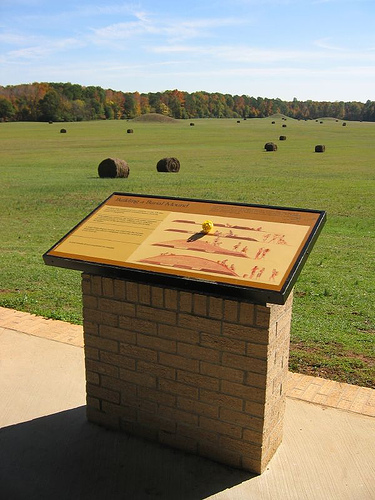
Pharr mounds, Middle Woodland period archaeological site, Tupelo, Mississippi.
(*photo credit)
September 14, 2018 Chemical Weapons: Bluegrass Army Depot
I live downwind from the storage bunkers of the chemical arsenal at the Bluegrass Army Depot in the next county (Madison) here in Kentucky. It is thirteen miles as the crow flies, but at times it feels even closer. The site is a military complex near the epicenter of the infamous 1862 Civil War Battle of Richmond. On the site is stored one of the world's largest collections (523 tons) of aging chemical mustard and nerve gas shells and assorted ordnance. Accidental escape could severely harm nearby residents.
According to treaty obligations to dispose of these weapons by 2012 most of the other sites are completely cleared of chemical weapons. The Kentucky facility has not yet begun the destructive process due to insistence that these be destroyed by a very safe process on site and not through transporting the weapons elsewhere. In Kentucky the destruction will be by neutralization followed by supercritical water oxidation, a process some citizen groups judged to be safer than routine incineration. The processing plant is now constructed and is being tested prior to operation. It will take several more years to complete the operation.
Local residents are fully aware that only a very small amount of escaped gas could cause havoc. The tranquil scene of beef cattle grazing in the field next to the storage areas gives no indication to the casual passerby of grave dangers. On my moving to Ravenna, neighbors told me that when they hear the sirens, they plan to grab the kids, jump in a car and head for neighboring outlying higher ground, since vapors cling closer to the ground. Designated escape routes are sent to all of our county's residents each year. "Just get out while the gettin's good."
When I first heard the weekly 1:00 p.m. practice siren, the thought that nerve gas had escaped did hit me. It was a new experience, even though I had lived about forty miles upwind of the depot for a quarter of a century. Downwind is different. Local teachers say they have been instructed, if their classes can't evacuate, to get all the schoolchildren to stuff their coats and sweaters around the window and door edges -- and then what? Think of a classroom of trapped youth! The local galley humor is that when you smell bananas (the tracer gas scent), breathe deeply.
The Bluegrass shells stay stored, even though the window of time for conforming to treaty obligations has closed. Madison County, where the depot is located, is a highly populated Kentucky county. Are these aging weapons dangerous? Yes, but effort is being made to detect and contain leaks by transferring to larger sealable containers. What if there was a severe earthquake even though these containing storage places could and have withstood tornadoes? We pray that the aging weapons continue to stay safe until the destruction process is completed.
Prayer: Lord, show us life's risks and help us to cope with them and to reduce them through vigilant safeguards.

Our Lady of Guadalupe, Good Shepherd Catholic Church, Frankfort, KY.
(*photo credit)
September 15, 2018 Begin National Hispanic Heritage Month
We ought to celebrate the contributions made by Hispanics in our country, especially since their numbers continue to rise in our nation. Today much attention is now being given to immigration reform and the treating of all residents in our land with proper dignity and respect. This is a stumbling point, especially to nativists who think the Anglo-Saxon legacy is being threatened.
The states that were colonially Spanish include California, Texas, New Mexico, Arizona, Nevada, and Florida. Others states such as Colorado could be added depending on the degree of cultural impact by Spanish people. The total population of the states just mentioned is about one-third of the total U.S. population. Hispanics in these and most of the remaining states of our country are a growing minority and comprise about 60 million people, with half of last year's U.S. population increase being Hispanic. The ethnic maps at this web site indicate expanding Hispanic influence in such unlikely places as Georgia, North Carolina, and Kansas.
A closer look at county-by-county statistics shows sizeable increases of Hispanics in virtually every state in the Union. Hispanics are now America's largest minority, and this worries some who fret that their "Anglo" identity will cease (only their supposed privileges might be challenged). Spanish as a second language cannot be denied. However, wouldn't our country becoming officially bilingual be a blessing? Often second generation Americans reject their parents' traditions and native tongues -- to everyone's detriment. May our Hispanic people avoid this trend.
As a nation we have much to be grateful for in our Spanish heritage. The sense of hard work and family life are often mentioned as characteristics of the Hispanic community. A mark of solidarity and friendliness prevails, as well as the many traditions both cultural and religious that are carried over into this country -- shrines, festivals, fiestas, and special days to honor loved ones both living and dead. The Hispanic tradition is one of hospitality, politeness and formal respect -- though with time some of these grand traditions may erode as do others within our American culture.
The firm bonds that unite the nations in the Western Hemisphere will only grow with a deepening appreciation of our Hispanic heritage. This is the time to reaffirm that bonding, which really started long before the Monroe Doctrine, and yet has grown with Pan-American unionism and trade treaties -- some of which are yet to prove their worth. Hopefully the United States as so-called big brother will not play a repressive economic and political role, for Latin America has suffered through subtle economic imperialism. Hopefully, that period is behind us and in its place is a respect for the expanding Hispanic culture.
Prayer: Give us, Lord, a love of all who bring their culture to our land and enrich it accordingly, especially Hispanics.
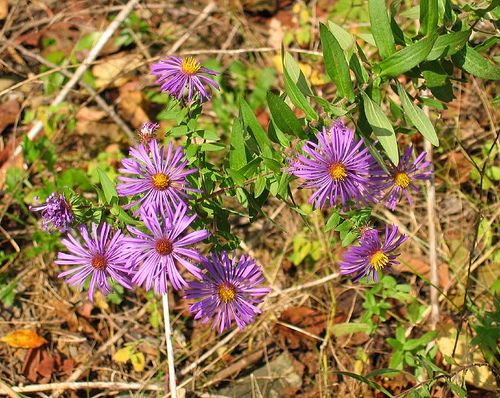
Aromatic aster, Symphyotrichum oblongifolium.
(*photo credit)
September 16, 2018 Denial, Cross and Good Deeds
If you wish to be a follower of mine, deny yourself, take up your cross and follow after me. (Mark 8: 34)
Today's Gospel reading fits very closely Friday's feast of the Exaltation of the Holy Cross. In both, the instrument is part of the message of service in which we are called to participate at this time. The message of service is to go to the world, and those called "Christian" are impelled to proclaim that message both in word and in deed.
Denial of self is utterly needed at this time. The heavier onus falls on the affluent people, a category to which many of our readers belong. We all must deny ourselves some of those conveniences, luxuries and food items that take extra resources to produce, process, transport, and use within our individual lives. To live more simply requires our knowing what is more or less extravagant, and then doing something to correct this practice. Simplifying our lives allows us to reduce selfishness and hear the need to serve others in the name of Christ.
The cross refers to the obstacles and barriers in our own lives that must be accepted or overcome in some fashion. Some of us lack this or that talent, or have a weakness or shortcoming that would apparently hinder us from our mission. Some folks neglect to fathom the importance of their own crosses; other excuse themselves from doing good deeds, precisely because they focus on the crosses that they have; still others seek to escape from following the Lord through abusive substances & practices. We must know our crosses, accept them with and for others, and adjust behavior accordingly.
Good deeds are more than saying words of comfort. We need to discern first what deed will be effective. Often those most vocal and forward are not those in most need; responding to those in less need could be counterproductive, if it rewards the pushy at the expense of the backward. Instead we are to discern prayerfully, choose wisely and decide carefully what needs to be done as meaningful assistance at the proper place and time.
Perfect deeds occur when we do them out of love of Christ, as understood in our giving relief to the poor and sharing with them. If we take on the mind of the poor in our actions, whatever their range, we are on the most perfect level of humility (going from seeing the poor, to acting for the poor, and to being with the poor in our action). Depending on our talents and opportunities, we enter into direct service such as feeding others; but looking more deeply we find that empowerment is a better practice; this assists others in improving their manner of acting and in changing institutions that cause the poverty.
Prayer: Lord Jesus, teach us as you taught your Disciples, and allow us the space and time it takes to become true and faithful followers through proper caregiving.
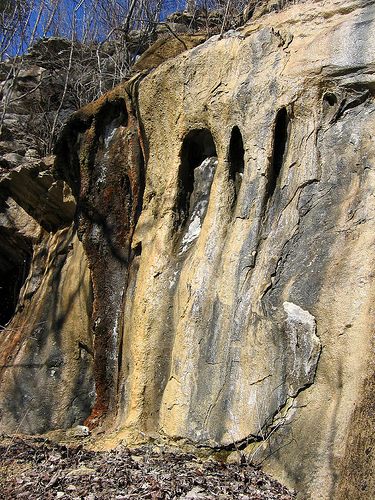
Travertine formation, Madison Co., KY.
(*photo credit)
September 17, 2018 Citizenship Day and Model Citizens
This is Citizenship Day, and an opportunity to list the duties we have as citizens and recall the model citizens in our American history. Looking about for current good citizens can be difficult. I suggest two books on early Americans: The Son of Thunder: Patrick Henry and the American Republic by Henry Mayer and James Monroe: the Quest for National Identity by Harry Ammon, both books published by the University Press of Virginia. They reveal citizenship during the American Revolutionary period with little emphasis on battle reports -- though Monroe crossed the Delaware with Washington, and took part in other campaigns. That revolutionary conflict started rapidly and grew in intensity.
Henry and Monroe were Virginians, lawyers and farmers -- but very different personalities. Patrick Henry was a talented poor boy who was practical, excitable, popular, and always tending to an evangelistic preaching style in legislative and court house addresses. "Forbid it, Almighty God. I know not what course others may take, but as for me -- give me liberty or give me death." His radical firebrand nature excited the frontiersmen and the Virginia countryside; he was regarded as a true patriot to radicals throughout the colonies, a human catalyst for revolution and ultimate independence. However, he was not keen on a strong central government. He lacked the intellectual talents of John and Samuel Adams, both of who still respected his approach. However, other political figures including Virginian Tories considered him a maverick. He was Virginia's governor for five years.
James Monroe was a young college student from Virginia lowland aristocracy at the time of Revolution. He volunteered for the army, became an officer, left the service during the War, became a lawyer and statesman and gave immense service as legislator, representative, ambassador, secretary of state, and president. He was popular and non-partisan and essentially was the only president elected unopposed. He was intense, honest to the point of scrupulosity, sensitive to the needs of others, discerning, and forward thinking in so many ways. At first, he was similar in political philosophy to Henry, but drifted apart with time.
In reading these two lives, we come to appreciate the early struggles of our Republic and the credit due those good citizens. Today we desperately need the fervor of a Patrick Henry, for our nation must move to become a full participant in a globalizing process. Furthermore, economic interests must be tamed and controlled. We also need the cool-headedness and absolute honesty of a person like James Monroe as national leader. He was often not in the forefront with quotable messages to the media, but his persistent devotion helped carry our country through some very difficult times.
Prayer: Lord, inspire us to be good citizens, not only at the local and national level, but as global citizens, for we need to work in harmony to solve the problems associated with climate change.
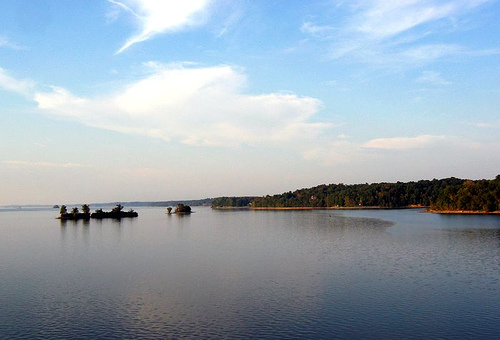
Skies over Lake Barkley, KY.
(*photo credit)
September 18, 2018 World Water Monitoring Day
Global water resources are under threat in a number of ways and we are just now becoming aware of the acute problem. On first glance, one asks, "With water occupying four-fifths of the Earth's surface, how could there ever be a water problem?" However, the problem rests with accessible water for meeting essential needs. Serious water problems arise with oceans warming through climate change, streams being polluted, and supplies of potable water are limited in some congested areas. To address these problems the water needs to be monitored, so as to preserve higher quality and to distribute justly the limited amounts where needed. Some live a higher lifestyle of swimming pools and lawn watering, while others need the same water supply for irrigation or for potable water or for livestock.
Free drinking water at common village wells or streams has given way to expensive bottled water that is obtained from soft drink-dispensing machines. Running water in natural streams was always regarded as a common property, but is not any longer: the shores or riparian rights have been claimed as property by individuals; water rights have been allocated to individuals or corporations. Privatizing water becomes a profitable business where water shortages occur. Throughout history, the public water fountains in town squares were examples of water freely used. Now the commercial water industry sells potable water like soft drinks; even plastic water containers are of serious ecological concern.
Throughout the planet, polluted water due to increased industrialization and congestion indicates infringement on the right to clean water. Especially this is true when polluters succeed in returning water in poorer quality without compensating for damages to the commons. In the past century, horror stories about polluted water abounded: in the 1960s the Cuyahoga River near Cleveland caught fire; India's sacred Ganges became a sewer; some of China's major rivers near industrialized sites were laced with heavy pollutants; in Appalachia "straight pipes" ran sewage into waterways in hope that "dilution is the solution to pollution."
In dry regions heavy irrigation demand takes away access to adequate water supplies for residents in urban areas. Rivers are drying up before they reach the ocean (e.g., the Indus, the Colorado, the Yellow, and the Rio Grande). The Jordan is a brackish streamlet before it reaches the Dead Sea. American cities are experiencing severe water problems. San Antonio, which draws most of its water from the Edwards Aquifer, is experiencing a shrinkage of the water table with urban expansions; for every 75 gallons of groundwater that are pumped for the city, only 60 are returned. The world's water woes grow by the day. Monitoring and proper enforcement of limited water distribution is utterly needed.
Prayer: Lord, allow us to share precious higher quality water with all, and especially with those who are thirsty; may all have the water needed for essential services.

Storm clouds build over late summer Kentucky skyline.
(*photo credit)
September 19, 2018 Stay Calm in Stormy Weather
"Stormy Weather" was an old musical starring Lena Horn that connected us with how we act during times of storms, including the physical and emotional ones we encounter on our journey of life.
Storms have a way of focusing us quite well.
I remember my near panic when on a trip with my parents in 1981. While we were visiting Charleston, South Carolina, the radio announced that a hurricane was approaching. We had wondered why the streets became so deserted in a very short time. Like the local inhabitants, we immediately attempted to get out of the way and let the storm approach with all its fury. Upon saving our precious necks, we paused and wondered why we panicked.
Recently I was visiting the local senior citizens institution, when our local sirens were blaring about a stormy condition. The staff had moved all the residents into the hallways away from glass windows. As I walked through, I saw panic in the eyes of many of these elderly folks. I said, "Don't worry it is missing us," though I was no better informed than they were. Fright is natural.
Some people are not frightened by stormy weather and seem to glory in getting right out in the middle of the rain and wind. Some of these take unnecessary risks. A few such nuts just want to greet the incoming hurricane -- even though these put the police at risk in trying to get them to evacuate or attempting o rescue them later; the resisters like to confront the storm in all its intensity, and regard it a thrill to live through such an episode.
Hurricanes seem to be coming with greater frequency and violence (last year was Harvey, Irma, Maria, Jose and Nate) -- and some scientists see this as a result of increasing ocean temperature due to global warming. The culprits are ultimately ourselves, for we use electricity from powerplants running on fuels that result in carbon dioxide emissions. By cutting electricity use, such as through energy efficiency, we can reduce the need for fossil fuels and thus the resulting emissions. Yes, we could be in part causing a certain number of storms, and these may hurt or kill people thousands of miles from here. And let's obey authorities who want to keep us safe by getting out of the way of storms.
But human-induced storms of personal discord are far more evident to us, and these also demand our full attention. We can become the ones who calm the storms in more directly observable ways than simply using less electricity. When local personal storms arise, we may have an opportunity to say a good word, to take an emotionally person aside and cool the situation, or to get all parties to talk with each other. We become other christs to them -- and these occasions come all too often.
Prayer: Lord, inspire us to address climate change and learn to use resources with respect. Help us to be better prepared to meet calmly the storms in our world and personal life.

Kirtland's warbler habitat, Roscommon, MI.
(*photo credit)
September 20, 2018 Dethroning King Coal
The current Administration has tried awfully hard to revive coal, the once king of the energy issue. Unfortunately, too much energy policy of the Trump Era has been wishful thinking to return Big Energy friends back to their highly profitable status. Of all the fossil fuels coal has suffered from being half the electricity source at the turn of the century to less than one third today -- and still falling. Governmental regulations was not the deciding factor, but rather the advent of cheap natural gas through fracking and also rapid rise of solar and wind as renewable energy sources.
Although plentiful and relatively cheap, this carbonaceous fuel called coal has proved worrisome in the global attempts to cut carbon dioxide emissions that are causing dramatic climate change. Add to this the well-known ill effects of coal extraction (polluting and toxic emissions, mountaintop removal, streams contaminated, and communities threatened). The health of workers such as due to "black lung" has proved increasingly costly.
Many Appalachian landholders sold to coal companies "broadform deeds" years before the strip mining operations, as they thought that coal companies would extract the coal through deep mining practice. To their surprise they found that the deeds allowed coal companies to move in with earth movers and destroy their community and sometimes even their homes. In the 1960s, the Widow Combs chose to stop the bulldozers by lying down in front of them at her home. She was forcefully removed to allow the coal on her property to be strip mined. Three decades later that Kentucky broadform deed permission was revoked. The late writer and friend, Harry Caudill, in his book, Night Comes to the Cumberlands, documented a host of abusive practices caused by coal extraction, which harmed his people.
Truly king coal is a mixed blessing. Some have called for less polluting coal combustion methods or sequestering the emitted carbon dioxide by pumping it into abandoned sealed mines; still other seek the elimination of this energy source altogether.
The importance of this fuel at this time will make a complete halt highly unlikely in the near future. A decade ago three trains with about 110 cars each, filled with coal, sat within sight of where I am writing here in Ravenna, Kentucky -- a longtime major coal rail center. This was coal headed for powerplants in Georgia and Florida. We have not had a coal train pass through since 2016.
Can anything be done to save king coal? It will remain a transition fuel until renewable energy takes over completely in about three decades. Non-fossil fuel energy alternatives (wind, solar, geothermal, etc.), along with energy conservation, are the only long-term solutions -- but it takes time to install them.
Prayer: Lord, give us the courage to speak out and debunk the regal nature of coal; give us the courage to lead the way to solar and other non-polluting energy sources.
Elder Wisdom: Some characteristics
The subject of wisdom becomes a challenge for elders who are not regarded as at the cutting edge of progress. Older folks have some experience lacking in those of middle age or younger; they could be an integral part of collaboration on policy issues. But the culture of retirement disallows them from performing as key components in our society; they are often regarded as outmoded, spent and at best tolerated. Perhaps, just perhaps, elders have something unique to contribute to modern rapid-moving, consumer-oriented, secular-inclined society, if they (we) have the courage to speak out openly; here are some good talking points:
Shortness of life. Psalm 90 says that wisdom is knowing the shortness of our lives. Elders see things in a broader perspective; the span of mortal life is shrinking; we have a multitude of experiences that can be broadly assorted into helpful or harmful. The honest insight to our ever shortening life span is that our vivid youthful experiences remain, even amid recasting as occurring a "short time ago." From an elder's perspective the life span is not that different and thus earlier experiences are still pertinent to some extent -- and deserve to be a reference for current actions. Urgency arises since little time remains.
Reckoning problems. At the time we are engaged in an issue, it may appear unsolvable and overwhelming, and yet with time it can be addressed with some degree of equanimity. With years it becomes evident that problems differ in degree of seriousness; some can be easily solved with few resources, and some simply cannot. Unfortunately, without discernment we will expend much energy on small issues and simply "kick the can down the road" on big ones (e.g. climate change). The act of excusing ourselves from knotty situations or escaping to easier ones is all too human, and elders know in their heart of hearts that such recourse is too frequent. In calmer moments, elders are able to rise above persistent personal problems and focus more on the bigger issues.
Limited ambitions. As we age the chances that we can be highly successful in some working arena or the use of some talent grows slimmer -- and we realize it. Ambitious expectations shrink, but do they really? Much depends on the elder's total perspective. Believers in a future respond through continual spiritual growth and discover greater peace of soul. Ambitions change with time: the temporal takes less precedent; the eternal loom in an emerging horizon. All the while, the desire to complete existing missions faces limited time and energy constraints. Many (not all) elders come to terms with their lack of success, or regard current issues as things to pass on to those with adequate resources to complete the task. Acknowledging limitations becomes an opportunity to cast off false ambitions or concerns about peer review, neighborly gossip or public failure. Recall Ben Franklin at the framing of our Federal Constitution called for limiting persona wealth; he got no support from privileged delegates. Was he crazy or was he wise?
Freedom to speak. Inhibitions diminish with age along with the perceived barriers that hinder people from speaking. Hesitancy in my earlier ministry for a new economic order gave way to a recent advocacy of an issue that I should have addressed decades ago. Our expanded elder freedom calls for choosing words wisely, for we want to be heard in a cacophony of competing voices. Furthermore, it is difficult to criticize younger people when our past inhibitions kept us silence for decades. Yes, current status quo permits the billionaires to retain influence and immense wealth needed to rebuild our national infrastructure. All need courage to speak up amid the shadow of immense power wielded by the privileged few who overwhelm us through untaxed wealth used for political gain.
Social justice issues. Retired citizens are freer to speak and venture beyond their field of expertise; they are less prone to embarrassment when talking on various subjects, especially social issues such as abolition of death penalty, or private prisons, or jailing for lack of bonding, or lawyers accessible to the poor. Many cultures, both primitive and developed, respect their elders and allow them to speak. However, our more youthful culture records the loudest voice, the most photogenic young activist. Less energetic elders are shoved to the side. All the while our business, governmental and economic worlds lack wise counsel; too often they are unable to address issues such as consumer excess, rampant militarism, and failure to exact fair taxes from the super-rich. Elders seeing the burdens shifted to future generations must break silence, for the increasing indebtedness and procrastination with a class system are unwise aspects of our culture.
Issue fatigue. Decline in physical strength with age should not hold us back. All ages suffer from issue fatigue. Granted the attention span of the very young and many adults is short, still with matters of importance elders have a certain endurance coming from past experience. In fact, elders all too often repeat their concerns over and over to the annoyance of younger folks, with hope that repetition will have an effect. The issues we hold most dear (mixed with fear that they will be unresolved in our lifetime) keep us repeating for emphasis. Yes, fatigue occurs on the subject of climate change to our threatened Earth, but we elders must not allow this planet-threatening matter to fade away.
Living more simply. Survivors of the Great Depression recall simpler days. Elders are more skeptical of newer things such as electronic devices and gadgets; these are less enticing as well as more challenging -- take "The Internet of Things" or the driverless auto. Consider that 95% of Americans have cell phones; most owners are willing to admit that there is independent scientific evidence that possible cancers could result from radiation emitted from these devices; this is particularly worrisome for steady users. "How Big Wireless Made Us Think That Cell Phones Are Safe." The Nation (April 23, 2018). Elders are less prone to be deceived by merchants of doubt, who pretend these devices are fully safe; elders use them more sparingly. Please spread the word.

Gratitude in the eyes of beloved pet.
(*photo credit)
September 21, 2018 Observe World Gratitude Day
Every day is the opportunity to say thanks, but let's give it special attention today. We take things for granted and neglect to say thanks for the simple gifts of life. Today we ought to redouble efforts to limit the effects of climate change. Being grateful includes returning harmony to our earth and inhabitants. A neglect of gratitude leads to a false sense of privilege, and to the belief that we deserve these gifts. Americans have used far more of the world's resources than our proportion of global population; we did not thank Native Americans who welcomed us to these shores; we read that slaves and indentured servants helped in building of our nation; and we are often forgetful of our ancestors in the faith for their contributions to making us who we are.
Give thanks every day. Many of us seek to be relevant or sociable. Few of us take the effort to say a profound "thanks" for the many gifts given to us. Will we become more grateful, if deprived of these gifts through illness, natural catastrophe, or human misdeed? Not necessarily. Gratitude is foreign to those who expect too much -- and the loss may trigger bitterness and anger on the part of greedy receivers and never givers. Rather, let us all resolve to thank God daily for gifts given.
Encourage a "thank you." Have you forgotten something? The reminder may be said in different degrees of humor, authority or sternness, and may possibly sound oppressive. Maybe a small admission that I often forget to be grateful could punctuate the teaching moment for others both young and old. With continued generous subsidies or charity, people tend to believe that they deserve to receive more and more and more. On the other hand, when someone is dying offer them an opportunity to say thanks for life.
Cultivate spontaneous and unexpected thanks. Think of the hard work by the underpaid or overlooked service personnel, and give these folks a nod of approval. What about the brave souls who devoted much of their lives to religious testimony, scientific research, or arts and crafts? What about those who serve or have served in the military? Think of those who copied manuscripts and literature that preserved western civilization? What about the unwritten cultural achievements of those speaking languages that are soon to be extinguished for lack of native speakers? Do we recall the people who provided us with essential services?
Demand a public thankful attitude. Our country and world take far too much for granted. We walk about the beautiful and fragile world around us and forget to say "thanks" to the Creator who gave us many good gifts worth recognizing, not just on an individual or family level, but in public acts of gratitude. The ungrateful should not rule the day? Omitting the Giver of gifts is to spread the sense that all is owed, and nothing is deserving of thanks.
Prayer: Lord, thank You for the opportunity to live at this time and to be of service to the many who are in need.

Late summer hike, Cumberland Gap National Historical Park.
(*photo credit)
September 22, 2018 Autumnal Equinox and Peace
Fall slips in on us. The year is maturing, and we may become restless knowing how the growing season is coming to an end and daylight is waning. Yesterday was the International Day of Peace and today is the advent of autumn, and these two events are related. Sometimes a healthy restlessness should lead to our trying to help bring peace to what appears to be a shortening span of opportunity. Seasonal changes and challenges are global.
When I was a young child, the Second World War was in full swing. I played out the conflict by battling the knee-high wild amaranth that had consumed my family's barn yard. This plant with its thorns covered much of the surface of the half acre plot and was ignored by the livestock. I would slay the plants with my stick that served as a bomber on a hostile city -- a child's play. Open the grass for the cattle. Perhaps we play around with peace in much the same way. We say "peace," but take our aggressions out in meaningless ways not attacking conflicts at their sources. Autumn reminds us that our opportunities are finite, and we must make the best of a changing world and not by meaningless child's play. We must seize the moment. Our nation is fighting a seemingly interminable Middle East struggle; we need to pray for peaceful solutions on a host of fronts, or otherwise our economic and psychic resources will be drained away by meaningless actions.
We must give peace a chance, but how? Let's give special attention to our privileges that go unchecked: squandering world resources; a military industrial complex that saps our resources; lack of health insurance on the part of millions of citizens; and a billion hungry people on this planet. We protest that we do not want to be "warlike," but are we? Can we Americans find the opportunity to transfer some of our half-share in the massive global annual $1.5 trillion military budget to bringing about peaceful solutions to the world's problems?
Should one billion hungry people disturb our autumn rest? Transition to peace is needed. We cannot rest when our fellow brothers and sisters in any part of the world are lacking the essentials of life -- the homeless, the ill, the hungry. We do this as a people when we permit the un- and undertaxed privileged few to "possess" so much wealth, and to do what they want to with what they have. The gulf between rich and poor haunts us, and well it ought. Furthermore, we seem to lack the proper approach to peace on another front, namely the planet itself. We make war when we enhance global warming or when we permit the importation of exotic and invasive species. We also do so when we permit conditions to exist that threaten or extinguish our native plant and animal species. Conflict does not just occur between human beings, but by humans to plants and animals and Earth herself.
Prayer: Lord, allow us to see the advent of autumn as a fleeting time to establish peace in our hearts and minds; thus, we might resolve to bring peace to a troubled world.

Black form of Eastern tiger swallowtail,
Papilio glaucus.
(*photo credit)
September 23, 2018 Improving Our Service for Others
If anyone wishes to be first, he shall be the last of all and the servant of all. (Mark 9: 35)
In the Gospel of St. Mark today (9:30-37) we read of the discussion among the disciples as to who is the most important -- a common human conflict among immature folks. Often we hear a variation on whose political action or performance is better.
Seeing the task ahead clearly is the first step to performing greater service: a sick person needs caregiving; the job must be done well; the office holder must be effective; an individual needs fiscal responsibility. An essential service cries out for rendering. We may deny it, excuse ourselves, or seek to escape our responsibilities, or, with God's help, we could face the task head on and do something. It is a privilege to be born in these times and to have the opportunity to serve with needs all about. Granted people-oriented service is critically needed, but where do I fit in? The goal of people first, not economic profits, is always a challenge, but on reflection it is where God is leading each of us.
Knowing our talents and limitations is required for us to give greater service. Sometimes we dream of accomplishing feats that are really beyond us; other times we think we are not up to the task and shirk from attempting to do what has to be done. The answer is a humble acknowledgement of who we are -- along with a prayerful approach to what God wants us to do at this point in our lives. Really we can do much if we trust in the Lord. A humble approach keeps us from overrating or underrating our service. All of us have a noble and unique mission. Finding it is allowing the Spirit to work within us. Maybe we are not to be in complete control, but rather find a collaborative approach to our actions.
Selflessness takes ongoing practice. The words of James (3:16-4:3) prompt us to ask what are the "inner cravings that make war within our members." This control of self comes through the practice of self-denial, something that takes time and the discernment of spirits that tug at us from various directions. Our deepest personal gift from God is the ability to exercise our freedom, which is so often misunderstood. To act freely in a godly manner requires God's help through prayer, and thus we gradually grow in other-centeredness and ever deeper freedom.
God's Will and Service. The constancy in prayer helps us in moments of crisis or weakness to see that God is always with us. Jesus allows a child to be the example (Mark 9:36-37), for the Greek word for child and servant are the same; the vulnerability and dependency of the child must be recognized, and our quest for finding God's will is like a child's existential condition.
Prayer: Lord, teach us to be people of service to others, and help us to do the best we can; make us work in harmony to confront climate change in all its implications.

Grazing white-tailed deer, Odocoileus virginianus.
(*photo credit)
September 24, 2018 Should Wildlife Lovers Discourage Hunting?
With guns sounding outside during this squirrel season, I wonder once again about the sport of hunting. We have made a distinction between the sport and the necessity of hunting to obtain food essential to life (see November 6, 2017). Why kill the squirrels for they are not pests and are graceful to behold? I ask fewer questions about fishing, for a caught fish can be returned to the water; furthermore, fish are less sensate than higher mammals (a weak argument), fish is nutritious and easily prepared, and fishers do their thing to escape from stress.
Hunting is different, is dangerous, and is losing its popularity today. Reasons for fewer hunters include: the bother in acquiring gear and licenses and travel difficulties in reaching wildlife; the dangers posed by guns especially when one is not familiar with them; and, more importantly, increasing peer pressure in favor of wildlife to live undisturbed. What hunter wants to brag to an animal lover? Even driving down main street with a bagged buck on the truck is becoming less popular (no one does this with fish). The wildlife trophy is less respected -- and often downright opposed by home dwellers who are not afraid to voice their dissent. Wildlife lovers and trophy hunters do not mix.
A while back, hunting was a rite of passage for youth in which elders played the role of mentors. Hunters were to obey local regulations, obtain proper licenses, manifest care when near other people, respect private property, prepare and consume what was killed, and justify the sport. However, hunting is becoming a dilemma, and I admit the hunting ambivalence prevailed during my life. We always had enough livestock to butcher for meat, though I knew folks who needed what they hunted for their sparse table. When wildlife is a necessary source of food, hunting is serious work. As kids we "hunted" crows (aggressors in our corn fields); we held the right to bear arms and defend crops as constitutional. Hunting crows took skill; rabbit-hunting was child's play.
If hunting reduces a threatened wildlife, much of the argument against hunting is valid. However, even wildlife lovers may have to permit exceptions. Today, the number of deer is greater in America than in anytime in recorded history. The same may be approaching for wild turkeys and maybe wild geese. Without a sufficient predator animal population these abundant types of wildlife could become a burden on the environment and require thinning. Here some hunters are needed for wildlife population balance -- and gun-bearers are called upon. Some folks could use venison and turkey for their protein and this low-cost supplement is plentiful. If we eat what is around us, we truly become "Kentucky" or wherever we live. Local wildlife is nutritious, organic, homegrown and relatively plentiful, takes no effort to raise and have no antibiotics or growth hormones. Eat local excess, if you are a meat eater. Keep wildlife balanced.
Prayer: Lord, teach us all to respect wildlife.

Wild petunia, Ruellia strepens.
(*photo credit)
September 25, 2018 Climate Change Consumes Our Attention
We can still save our troubled planet, but it will take a global effort. Sixteen months ago President Trump decided to withdraw the U.S. from the Paris Climate Change Agreement; this spelled a major barrier to reaching a goal of less than two degrees rise in global temperature in the coming decades. Experts tell us that this goal is nearly impossible without super-efforts by the all nations including the U.S. All simply must collaborate.
The global weather has been getting warmer; ice caps are melting rapidly. Look about and see; stop and listen to what the wise are telling us. Step into a greenhouse, and notice how captured sun's rays converted to heat waves can't easily escape; the room warms. We notice the same effect in a parked automobile. However, the same warming effect occurs through increased concentrations of carbon dioxide and several other gases such as highly potent methane, which find their way into the planet's atmosphere. As levels of these gases rise through increased human industrial activity, especially fossil fuel powerplants and combustion engines, we can expect more rapid climate change.
New studies show the changes could double the size of that rise, and the result could be catastrophic in a few decades if cooperate action is not taken. Glaciers in higher elevations in Europe, Asia and the Americas, and the Antarctic ice cap are all melting. This, in turn, is causing the oceans to rise, thus affecting lower lying regions such as some of the small island nations in the Pacific Ocean, as well as the densely populated low-lying Bangladesh; that congested nation could lose half its land mass, if the oceans continue to rise at current rates for the next seventy years. Climate change also could result in some areas getting drier and others flooding, and some shifting to semi-tropic zones, and others losing permafrost and releasing more and more methane. All countries must change their lifestyle habits.
What does this mean? The move to renewable energy sources must be accelerated and retiring coal and other fossil fuels done likewise. The vehicle fleet that is changing to electric and hybrid cars is being increased. Energy efficiency on the part of all from lighting to air conditioning and insulation will also play a deciding role. A carbon tax would be an effective tool, but its possibility is not foreseeable. National policies must move from fossil fuel to renewable energy promotion in a pronounced degree. Efforts to divest from fossil fuel companies have expanded in recent years and will have some effect. All the applications for movement to a new economy must be encouraged along with prayer. Read Resonance: Promoting Harmony When Confronting Climate change. Instructions on finding this book are on this website.
Prayer: Lord, open our eyes to see what is occurring around us; open our hearts to be willing to change and to share resources with others; open our leaders' minds to institute policies that are favorable to a renewable energy economy.

Valley Pike Covered Bridge, Mason Co., KY.
(*photo credit)
September 26, 2018 Admiring and Preserving Covered Bridges
A few years back we posted a photograph on this website that precipitated a number of comments from viewers; these liked the idea of texts being accompanied by pictures -- a union of words with picture. From this developed the sizeable effort it takes our web manager, Janet Powell, to select and post pictures for every daily reflection (beginning in April, 2007). To date we have posted about three thousand photographs some with variations of the same theme, but many from many scenic parts of North America.
Let's return to the covered bridge, a sight so familiar in my youth that I overlooked its uniqueness. Today, few remain in the rural parts of Eastern America and especially in the Appalachian portions of our country. As bridges need repair, these antique bridges have been torn down and replaced by wider and sturdier concrete structures -- the only kinds that modern road builders would dare undertake. The heyday of the "covered bridge" was the early nineteenth century, and it was not because carpenters wanted to get into the bridge-building act. Such bridges did protect bridge flooring and structural timbers from the elements, but the true reason, my Dad confided to us, was that horses are frightened when crossing bridges. Many buggy riders with skittish horses had to blindfold their animals, and lead them across the span because of the fear of heights. Horses felt safe on covered bridges.
Pictured here is the Valley Pike Covered Bridge, across a tributary of Lee's Creek near the Valley Pike Road in my home County (Mason) in Kentucky. It is 34 feet long, 15 feet wide and 14 feet tall, and was built in 1864 and rebuilt in 1972; it is the only privately-owned covered bridge left in Kentucky. Twelve others are owned by highway departments; seven of these bridges are in the Buffalo Trace region. Other states such as Pennsylvania and West Virginia also have existing examples of covered bridges.
My favorite is the Goddard Covered Bridge in Fleming County, Kentucky, near State Route 32 southeast of Flemingsburg; it is the oldest (1820) and connected with wooden pegs. I can still remember the thrill of crossing that structure by auto years ago. It is in a beautiful setting with a white church in the background. It bears the hoof marks of Colonel Everett's cavalry unit of Morgan's Confederates when they raided this part of Kentucky in 1864. Let's hope these surviving covered bridges remain and retain the markings of our collective heritage.
Prayer: Lord, assist us to be bridge builders and preservers, to span the dangers that divide so many of us, and to provide a cover for those who bridge differences and continue to serve others as caregivers in their lives. Never allow us to forget that bridges make this world civilized, and add flavor to our culture and life. Let us learn to follow our Pope and be "pontifaxes" or builders of bridges.

Peering into the canopy of stately Eastern black walnut (Juglans nigra) trees.
(*photo credit)
September 27, 2018 Learn Something New Every Day
One family we knew well as youth had an involved parent who insisted in teaching the whole family a new word at each evening meal. Wow! Could he try that today? I admit that it is nice to still learn a new English word, for if I live a thousand years there would be more worth acquiring. If today is special or not, isn't it worth expanding our knowledge a little more? Well that is my current intention, but it is a growing challenge for an old man.
A few years ago I figured that the average life span was about 84 years. Why not divide 12 months into that 84 and allot every seven years a "month" in my life. Thus, January is age 1-7, February 8-14, etc. When in the spring time in life, this was a fun exercise -- and age 84 years a great distance in the future. With aging, the game became less interesting. Mid-summer appeared a little past fifty years with gray hairs and with a sense of melancholy foreboding that the hour glass was running lower on sand. By the "Autumn of life" I was ready to change the rules. Early life is short but is remote preparation for eternal life.
Today, life expectancy for white American males is 77 and that expectancy in America may start shortening due to opioids and increased drug-related deaths. With each new dawn we can prayerfully reaffirm that God is giving me the chance to be of service for a little longer. God is the author of life, and what we are given is a gift of life we must with due respect hold and cherish. None of us are "average" people, and thus we must see our lives as unique, as special, as worthy of creative response and cooperation with God. Today is a day of gratitude for the opportunity to serve and realize that this should be done every day that we are given the privilege to have mortal life.
The point is that each yearly birth event makes us more and more aware that current life is "borrowed" -- and we make the best of what we've got. We also look back with regrets for not using the past more perfectly; however, even those imperfect times were part of the experience that we now have that will help us to make the future a little better -- however long it may be. In fact, the game of allotting time for the seasons of our lives cannot be fully calculated until we die, unless we know heavens forbid for certain our execution date. I am unsure whether such a game of seasons of life should even be recommended, for God is the author of all life.
Beyond game play we could discover that recognizing our age as a gift does have value: we become aware of our time as God's gift; we realize how our lives change like the seasons, and even the way we look upon life over time. We eventually see ourselves as mortal, as limited in the time we have, as willing to make the best of what remains, and as undeserving of a long or short life.
Prayer: Lord, we thank you for the gift of life, the time already given and the time that remains. Help us see every day as an opportunity for being and doing something new.
Elderly Wisdom: Focus on End of Life Issues
All of us like a certain degree of diversity, for that adds to the quality of our lives. Some find diversity in varied food menus, different places to visit, a multitude of hobbies and small daily activities, or a choice of books or forms of entertainment. All the while, ordinary folks will adhere to a fixed schedule of other daily activities: periods of rest and eating, room temperature, and clothing styles. In obeying daily routine there is some degree of focus to details, for routine demands a degree of self control from youth at the age of reason to the elderly with mental balance. All of us strive to perform daily routines with finesse even, perhaps, when needing assistance from others.
This balance of deliberate diversity and conforming routine is all part of life's journey. To stay in charge of our life demands that we focus on detail to some degree, whether to make variety work for us or to make our daily operations move smoothly. The balance is important, but so are deeper issues such as long-term goals, political and economic views, and attitudes and choices affecting social interaction. We are more than isolated individuals; we belong to a society that both influences us and is influenced by our actions. How well we adjust our journey in life even when it differs from some previous expectations is important. We are all subjects of dramatic change, especially that last notation on our tombstone; ultimate change is too personal and social to dismiss. The call for focusing exists as long as we have mental balance and this continues through our establishing of rational plans and instructions.
During the span of good mental health we have the opportunity to prepare for our ultimate passing -- a spiritual exercise. That preparation includes realistic issues such as selecting someone with the power of attorney, or one in charge of disposing of property or keepsakes; it might even include the details of inevitable funeral arrangements. The worldly may opt to postpone such preparation and concoct the youthful mentality of thinking they will never die. However, with reduced available time through aging, a sense of long-term focusing becomes an emerging reality. Certainly some youth and middle aged adults are accomplished with the art of focusing on valuable undertakings related to developing talents, skills and careers; however far too many people find focusing an unpleasant chore and they omit it to the detriment of family life, social grace, civic duty and spiritual growth.
Focusing on the broadest issues of life itself takes a certain special effort, but is a spiritual exercise. Again, most pre-teens think they will never die; life and death issues are not in their purview. The same applies to those in their teens and twenties; for them, end of life is so remote that it does not deserve attention in the busy world of ordinary living. This is the time period when religious practice drifts and commitment to prior structures loosen. These often let spiritual matters slide.
End of life issues emerge slowly in the more or less tranquil aging years. Tomorrow comes ever more quickly. "Tomorrow and tomorrow and tomorrow brings on its petty pace from day to day." Personal transformation is a remotely future event for those who procrastinate; on the other hand, for elders who see life change through growing limitations and unfulfilled promises, the world deserves some degree of focus on end of life issues. Obituaries of friends and acquaintances take on greater significance as the list of the parted grows and those dying are younger than the reader.
When health issues mount, elders, like prisoners waiting on death row, tend to focus a little more on last matters. For people of faith, this becomes a profoundly spiritual matter; for the Christian, the cross becomes a reality as health deteriorates; for those with no belief in eternal life this ending is upsetting and not worth mentioning. The norm is to speak of "passing" and not death. Peace of mind is tested when confronting end of life issues and certainly much depends on what spiritual or worldly road one is following. Let's take the shrinking span of mortal life seriously.
Daily, public overdose deaths and DUI accidents remind us that this unpleasant focus is worth a little quality time. All too often elders remind younger folks that our mortal lives are short, need respecting, and affect others. Yes, self-centeredness can block out social implications -- and even elders are not immune from such practices. However, while in a good mental state, let's focus on end of life issues, for mortality is limited while eternity is not. We are meant for God, and the transition to eternal life is a challenge and opportunity worth personal attention. Part of the wisdom of the aged is to make this a public issue worth discussing. Believers call such thoughts into focus. Let's welcome it when in or nearing life's autumn season.
Why not create a check list of "end of life" plans? Consider the following elements which are an expression of elder wisdom --
* Choose a person who has power of attorney designation and other persons on specific disposal and final arrangement issues;
* Establish "a living will" according to your own state specifications;
* Compose your final (financial) will or update it if changes are to be made over time;
* Decide on the manner of disposing of the body through use of casket or cremation:
* Assign a deserving place for donations in lieu of flowers;
* Designate recipients of keepsakes and all legacy items and have the listing registered or at least known to exist in a safe and accessible place;
* Lighten the burden on love ones by specifying funeral details and service (presiders, structure, hymns and pallbearers); and
* Perhaps if you so desire as one last moment of control, record your own eulogy or final words.
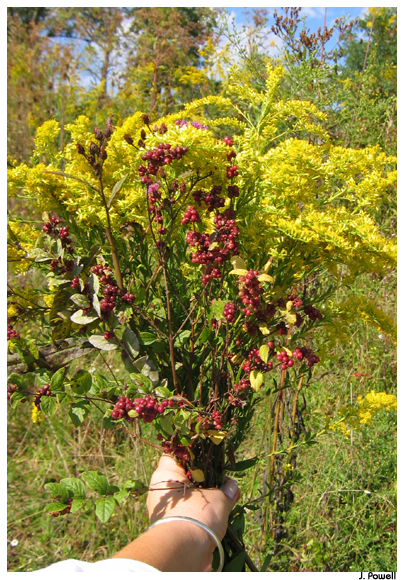
An autumn bouquet of native Kentucky plants.
(*photo credit)
September 28, 2018 Observe Native American Days
Most states have proclaimed their "Native American" day in early autumn. Today is California's. On these designated days we honor our Native Americans; we recognize their gifts and traditions, for these people have given much to make our country what it is. We note that almost half the states names, along with the names of many lakes, rivers, mountains and smaller regions are derived from Indian names. The history of past interactions between whites and Native Americans, from colonial times until now, is certainly imperfect: wars, broken treaties, takeover of lands, forceful removal of tribes from east of the Mississippi, the deliberate destruction of bison needed for food supplies, denial of voting privileges, exploitation and pollution of reservation lands.
Most of the indigenous people greeted the very first explorers, fur traders, and settlers. However, unintentionally those first contacts resulted in transmittal of diseases to which the natives had no immunity. Some estimate die-offs of over ninety percent of the 1491 population through these contacts. With time and emerging conflicts, a general Native American resistance to white incursions developed and led to fierce struggles with early homesteaders and settlers. Amid the onrush of white settlement, the native residents were pushed back to limited reservations, generally on less desirable lands. In some cases tribes simply disappeared, while many were removed to Oklahoma or western reservation areas. When gold was discovered in the Black Hills, "worthless Indian land" became valuable and the Sioux had to retreat further. In recent years exploiters have targeted nuclear wastes on Shoshone land, uranium mining on Navaho reservations and coal and fossil fuel extraction on Native American land. Renewable energy advances could counter these efforts (see August 30th).
Amid injustice, Native Americans have given our country much to be thankful for: from approaches to treating the environment to ways of democratic governance; from moccasins to canoes; from turkey, cranberries, squash, tomatoes, corn, and pumpkins to ways of fertilizing soil and using native plants for medicine. The manner in which Native Americans have treated land is well worth understanding and imitating, as is Native American respect for all plants and animals, along with a sense of gratitude for them.
With the pervasive influence of English in Native American areas, today we note that preserving Native American languages is difficult. If actions are not taken soon, many of the Native American languages will be among the global endangered language "species," which are dying at the rate of one every two weeks. The last Delaware-speaker passed from this life a few years back; more such tales will be told in the coming years unless a positive effort is made to preserve Native American culture. This takes a deep respect and an allotment of national resources.
Prayer: Lord, help us to respect and preserve the Native American culture that is a precious American collective heritage.
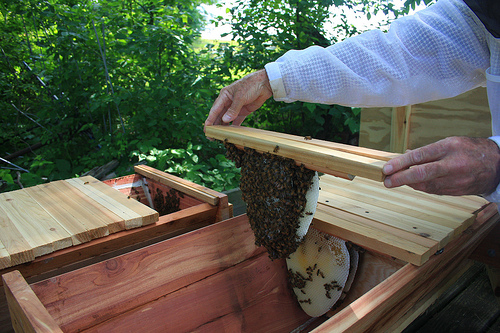
Appreciating the wisdom of the hive.
(*photo credit)
September 29, 2018 Let's Appreciate Our Teachers
The challenges we face today in a rapidly changing world require the best in mentors. These prepare us for the service we are to render in life. Perhaps all of us take our teachers either past or present for granted. Maybe a little appreciation is due, for that is gratitude for those who gave us the enthusiasm, repetition and patient work and who demanded persistence on our part. At times we think we deserve what we get, and never see that the efforts of others are so very critical. Perhaps part of our reluctance in extending appreciation stems from realizing that we have not lived up to our teachers' expectations of us.
* Say "thank you," while there is still an opportunity. Better yet, teach those with whom we are associated to say thank you to God, and to our former and current teachers.
* Support teachers. They are sometimes underpaid for the great work that they do. All honest and dedicated teachers need recognition for their efforts, as well as the support of the community. We need to show we are behind them. They maintained their enthusiasm, even when the students were anxious to move on to other things; they overcame obstacles in resource materials and unruly students; they were tired from work, but never complained.
* Promote teaching. Even those of us who are not intending to teach should value teaching, and be prepared to interest others in taking this as a meaningful and noble profession. The rapidly growing cost of higher education is more due to an expanding and costly administration rather than to increased educator salaries.
* Recall with happy memories. I dedicate this to the teachers of my life for this is most fitting. As I mentioned at the first of the month, my first and second grade teacher, Sister Imogene, a Clinton, Iowa, Franciscan, passed on to the Lord at 103 years in 2005. She said she remembered every face even when she had difficulty with names. Her religious community taught us in the spirit of St. Francis to respect the things around us, and especially our environment. They launched us on our life's journey, dedicating themselves with little expectation of earthly praise or financial rewards.
Recognize the power of teaching. Teachers appear to be master recyclers. They truly believe that the enthusiasm that they exhibit will be repeated by that next generation, when their charges grow up and mature as teachers themselves -- whether professional teachers or teaching in some fashion at home or work.
We need to realize that teaching is an integral part of extending civilization -- a delicate flower needing continued nurturing.
Prayer: Thank you, Lord, for allowing kindly and patient teachers to sacrifice for us, to give of their enthusiasm, and to change us in little or bigger ways. Thanks for the chance to extend what teachers did for us in our journey of life.
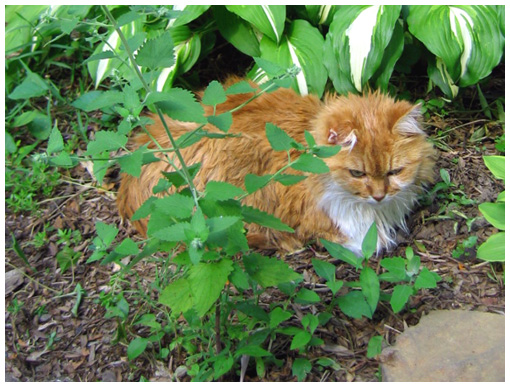
Discovering a beloved pet in the catnip garden.
(*photo credit)
September 30, 2018 Find God and Good in All
Anyone who is not against us is for us. (Mark 9:40)
This expression by Christ is far superior to a saying that those who neglect to bless us are cursing us. We are to have an open-minded approach to all God's gifts, whenever and wherever expressed, and to thank God for these gifts entrusted to others at unexpected times and places. We are to affirm those who have a positive approach to life and thank God for them.
We need to find a faith in the future among all people, even when the specifics of what they hold is different from ours. Without this positive approach to life the world cannot move forward, and through default we would allow selfishness and greed to prevail: "Let's use it up for tomorrow we will die." Those who reject a future for Earth herself (even some self-styled Christians), are in the company of the despairing -- and omitting this from our concern would lead to further greed and selfishness.
On the other hand, we reach out to all who have some hope in the future for themselves and their offspring. To reach out takes an effort, for we prefer to work with our "own." Our vision must be universal, and thus the Good News is to accept the possibility of collaboration with diverse people. Our general goal is to work in harmony with all others for the common good, the benefit of all.
Earthhealing involves looking about for kindred spirits, for we need the support of others in order to bring about change in the world and to usher in a renewable energy economy. In one sense, we need a critical mass of Christian believers to furnish the enthusiasm needed to bring this about. In a broader perspective we need the positive good will of all people who work for the future of our planet. Both are part of the amorphous community of Earthhealers. What is called for now is to create a harmony wherein those working can collaborate in a more meaningful fashion to halt climate change and assist those who are victims.
Naysayers often speak the loudest and draw the most attention. If their voices are allowed to go unchallenged, an atmosphere of negativism will arise like a mist and dampen the spirits of all. That is why spreading the Good News is really allowing people to proclaim that God is in all creation. Earth is a treasure worth saving, but we do face catastrophic conditions partly through our wastefulness and greed. As believers we even affirm that a New Heaven and New Earth has eternal glory. It is simply not fitting that we allow this fragile and beautiful Earth to die after so much effort has been expended to enhance it. We need to cultivate a deeper sense of compassion for victims of extreme weather and rising and warmer oceans. We affirm "faith in the future."
Prayer: Lord, we come before You shaken by the awesome task of saving our wounded planet; we need Your help; inspire us to become caring and compassionate earthhealers who trust in You.
|